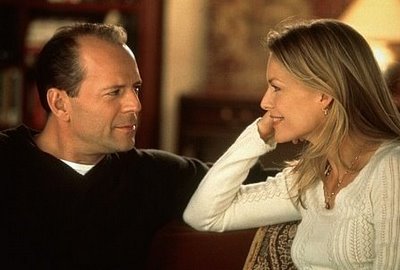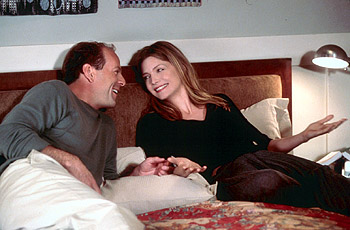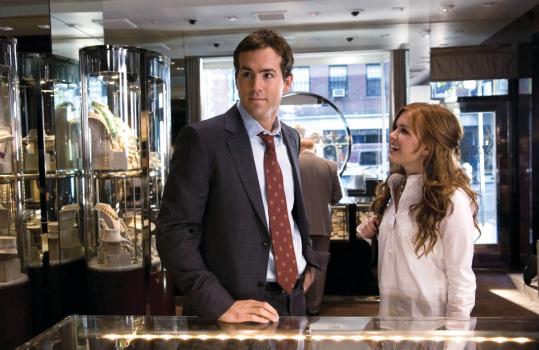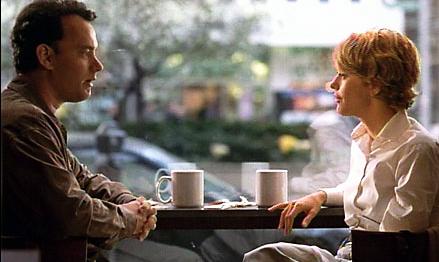compatibility
The Story of Us
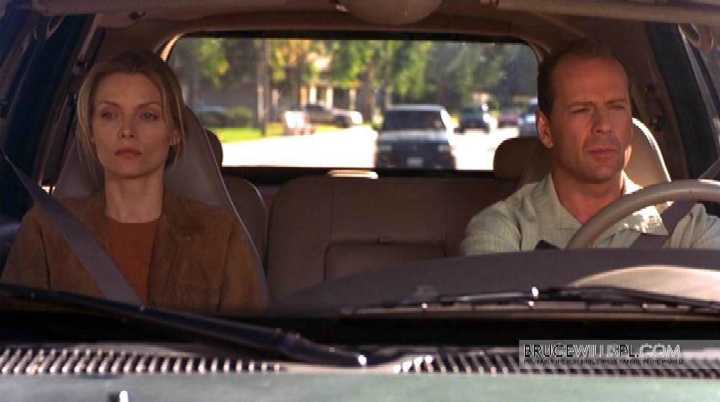 |
|
| Articles on The Story of Us |
|
|
| Plot Summary |
|
The Story of Us is the very real and humorous examination of Ben and Katie Jordan's marriage. After 15 years, the couple is wrestling with the universal paradox: why are the qualities that made them fall in love in the first place now the very things pulling them apart? Katie Jordan is the designated driver of the marriage. She likes having everything in its place, knowing that there are answers to the little questions and having a sense of closure. Her career as a crossword-puzzle designer fulfills her need to know that the little world on that half page is complete. And this is why Katie fell in love with Ben's imagination, spontaneity and playfulness. Ben Jordan, a writer, is a true romantic who believes in happy endings. But life demands some attention to details, and Ben doesn't know where the medicines are and he lets his washer-fluid light blink incessantly red. Ben's philosophy, as Katie describes it, is comparable to the children's book Harold and the Purple Crayon. Harold is a little boy who draws the world the way he wants it to be and not the way it actually is. Initially they were attracted to one another because they were so very different. Then they had arrived at a point where the very attributes that originally gave liveliness and joy to the relationship have become a source of friction, tension and frequent quarrels. Emotionally drained from their relationship, the Jordans attempt a trial separation while their children, Josh, 12, and Erin, 10, are away at summer camp. For both Ben and Katie, fighting has lately become the condition rather than the exception, and they believe that their only option is a silent retreat to neutral corners. While carrying out that decision they discover a deeper layer of emotional attachment which they cherish and are unwilling to give up. They recognize that their differences represent strengths by which they complement and complete one another. They realize that in the course of living their lives they had forgotten that their relationship and their children are more important than anything else. Ultimately familiarity, friendship, trust and love of their children prevail and they decide to remain together. |
The Story of Us
Directed by Rob Reiner
Written by Alan Zweibel & Jessie Nelson
Starring Bruce Willis as Ben Jordan, Michelle Pfeiffer as Katie Jordan
Copyright belongs to Castle Rock Entertainment
- Wikipedia offers all movie information: The Story of Us
- The Internet Movie Database has information related to the movie and its actors.
- Film details, Videos and other links can be found at the official website The Story of Us
Definitely Maybe
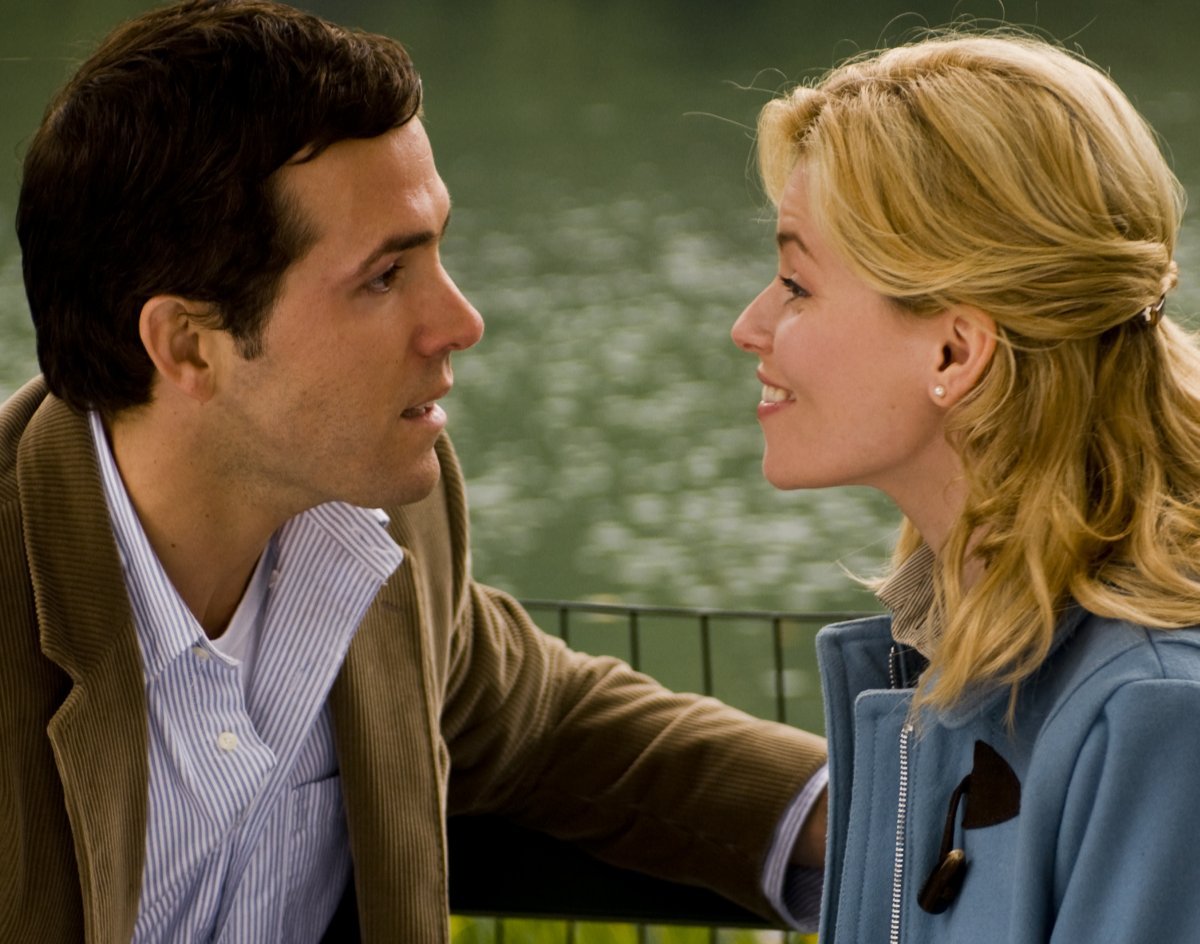 |
|
| Articles on Definitely Maybe |
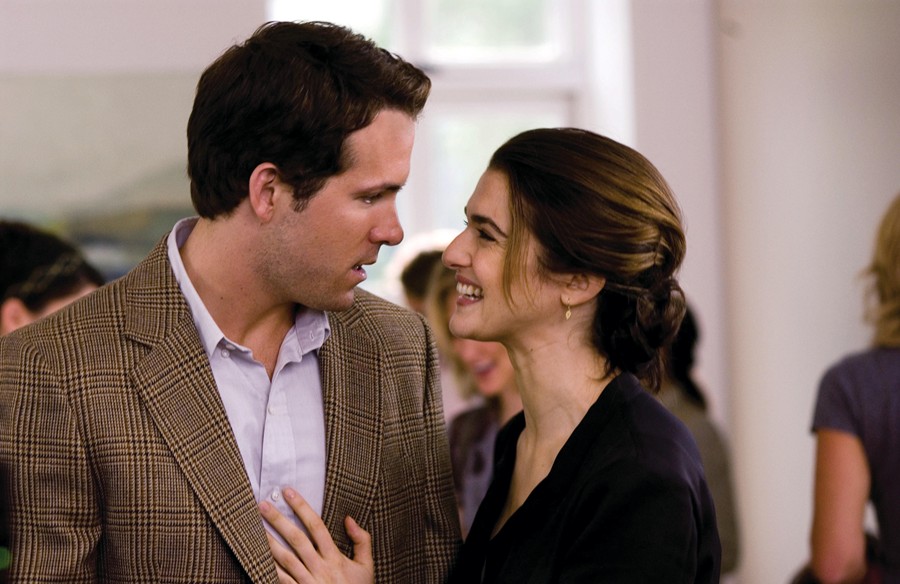  The basis of Will’s relationship with the 3 attractive women is analysed in this article on Love, Romance, Sex & Marriage. See the article and videos. The basis of Will’s relationship with the 3 attractive women is analysed in this article on Love, Romance, Sex & Marriage. See the article and videos. Read more and ask questions about this movie in the Movie Forums. Read more and ask questions about this movie in the Movie Forums. |
| Plot Summary |
|
Will Hayes, a thirty-something married dad, has just received his divorce papers when his 10 year old daughter, Maya, starts to question him about his life before marriage. Maya wants to know absolutely everything about how her parents met and fell in love. Will's story begins in 1992, as a young, starry-eyed aspiring politician who moves to New York from Wisconsin in order to work on the Clinton campaign. For Maya, Will relives his past as an idealistic young man learning the ins and outs of big city politics, and recounts the history of his romantic relationships with three very different women. Will attempts to narrate the story for his daughter with names changed so Maya has to guess who he finally married.
Will's first love is Emily, lovely co-ed at the University of Wisconsin who he regards as his future wife. He leaves Emily to spend the summer in New York working as a volunteer in Bill Clinton's election campaign, where he meets April, who is making photocopies in the same office. Summer is an old friend of Emily's aspiring to become a political columnist. Will spends the next decade trying to figure out which of the three he really loves.Emily visits New York, and Will proposes in Central Park, but Emily turns him down and confesses she slept with Will's former roommate in Wisconsin. Will is heartbroken. If Emily represents the attractions of a near-perfect wife, Summer was every man's dream of a perfect love affair. Beautiful, intelligent, sexually alluring and aggressive, she took Will's breath away. After a brief period of ecstatic sexual intimacy, he felt hopelessly in love and determined to propose. The very day he planned to give her an engagement ring, Summer published an article exposing the indiscretions of the politician Will was trying to get elected and trashing all hopes for the campaign, for Will's career and for his relationship with Summer. They both realized that Summer was not a woman who needed or could settle down in a permanent relationship. She enjoys freedom too much. Her first priority is her own career. Will walked away furious and deeply disappointed. He found April extremely attractive but he always felt that intimacy between them would be impossible, because they were so very different and opposite in many respects. They seemed to constantly challenge each other's beliefs and values. After Summer refused him when he proposed, Will got drunk and found the courage to confess to April that he loved her. Clearly moved and deeply in love with Will, April refused to take him on the rebound and told him to get his life together. Sometime later Will meets Emily again, marries and lives with her until Maya is 10 years old. Although they are both good, pleasant people and like each other, the elusive magic of romantic love did not outlast the initial period of infatuation. They never had a serious problem, but something essential was missing. What they had might have been more than enough for a normally successful marriage, but not for someone seeking real romance. Listening to Will's story, Maya perceived what Will had never understood. All the time his real love had been April, only he had been too frightened to admit he loved someone he believed would never accept him. At Maya's insistence, they call on April and the truth of their love for one another becomes evident. |
Definitely Maybe
Directed by Adam Brookes
Written by Adam Brookes
Starring Ryan Reynolds as Will Hayes, Isla Fisher as April, Abigail Breslin as Maya Hayes,
Elizabeth Banks as Emily, Rachel Weisz as Summer Hartley
Copyright belongs to Universal Pictures
- Wikipedia offers all movie information of Definitely Maybe
- The Internet Movie Database (Definitely Maybe) has information related to the movie, plot, actors and reviews.
- Definitely, Maybe - Film details, Videos and other links can be found at the official website.
- Definitely Maybe - Watch the Trailer from Youtube.
When Harry met Sally
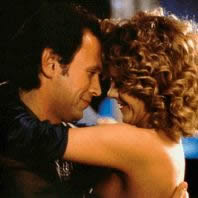 |
|
| Articles on When Harry met Sally |
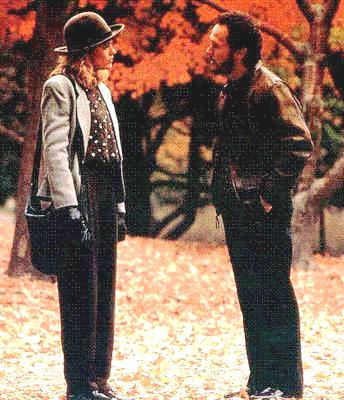  Growing in Love - Harry and Sally's relationship is a fine example of Vital Attraction, Level 4 on the Scale of Romance See the article and videos. Growing in Love - Harry and Sally's relationship is a fine example of Vital Attraction, Level 4 on the Scale of Romance See the article and videos. Love, Romance, Sex & Marriage - From Sexual Attraction to Friendship to Affection Read the article and videos. Love, Romance, Sex & Marriage - From Sexual Attraction to Friendship to Affection Read the article and videos. Contrast between two Relationships is brought out in this example of Reaction, Level 4 on the Scale of Harmony Read the article and videos. Contrast between two Relationships is brought out in this example of Reaction, Level 4 on the Scale of Harmony Read the article and videos. Read more and ask questions about this movie in the Movie Forums. Read more and ask questions about this movie in the Movie Forums. |
| Plot Summary |
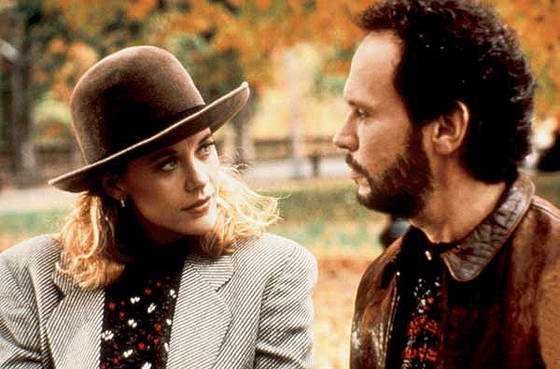
Harry meets Sally when they share a car ride to New York City upon graduation from the University of Chicago. A few minutes into the trip, the conversation between them becomes heatedly contentious. Harry is strongly attracted to Sally physically. Sally is repulsed by his aggressive manners and obvious sexual intentions. Over the next 13 years they meet repeatedly, then drift apart and meet again. Each passes through many failed relationships. Harry gets married and divorced. Eventually they develop a close, platonic friendship and find that they understand, like and enjoy each other’s company more than any other relationships they have been in. Observing the changing relationship between their close friends Jess and Marie, they acquire deeper insights into themselves and the challenges that every relationship has to overcome. Finally it dawns on them that life together is far happier and more fulfilling than their other romantic pursuits and an intense intimacy grows between them. |
When Harry Met Sally
Directed by Rob Reiner
Written by Nora Ephron
Starring Meg Ryan as Sally Albright, Bill Crystal as Harry Burns, Carrie Fisher as Marie, Bruno Kirby as Jess
Copyright belongs to CastleRock Entertainment
- Extensive details on the movie in Wikipedia When Harry met Sally
- The Internet Movie Database has information related to the movie and its actors.
- The Official website of the movie When Harry Met Sally
- Watch the Trailer of When Harry Met Sally from Youtube.
You've Got Mail!
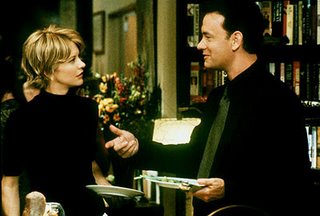 |
|
| Articles on You've Got Mail |
|
|
| Plot Summary |
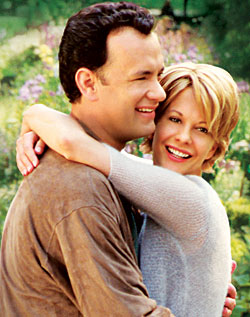 Kathleen Kelly is the owner of a little and famous bookstore for children's books in Manhattan, New York. Suddenly, her business gets endangered by the opening of Fox Books discount store just "around the corner". She meets Joe Fox, son of the owner, and soon gets annoyed by his arrogant way of managing business matters. Kathleen Kelly is the owner of a little and famous bookstore for children's books in Manhattan, New York. Suddenly, her business gets endangered by the opening of Fox Books discount store just "around the corner". She meets Joe Fox, son of the owner, and soon gets annoyed by his arrogant way of managing business matters.Joe and Kathy become bitter business enemies when Joe's superstore puts Kathy's little shop out of business. Meanwhile, the two of them meet in an online chatroom under the pseudonyms NY152 and Shopgirl, without knowing each other's the identity. What starts as anonymous flirting via e-mail slowly converts into a deeply meaningful relationship in which they confide in each other, share everyday life problems, and exchange their inmost thoughts and feelings. They finally agree to meet face-to-face. Joe discovers Shopgirl's true identity just before going to meet her. Realizing she will never accept him as her on-line friend when she knows who he really is, he conceals his true identity and creates occasions to run into her apparently by accident. Each time they meet, she abuses him for his cruel, ruthless business practices. Attracted by her gentle, affectionate sweetness, he comes to truly appreciate and understand Kathy's view of things. By contact with her, the ruthless, arrogant, sarcastic businessman gradually awakens to the joy of warm human relationship, small joys and compassionate human values. In exchange Kathy learns from Joe to be more assertive, face the challenges of life boldly, take hard decisions and move beyond the sense of failure arising from the closing of her store. Increasingly attracted to the real life Joe, her mind clings to the anonymous relationship with NY152, until Joe finally discloses that the two men she loves are one and the same person. |
Directed by Nora Ephron
Screenplay by Nora Ephron & Delia Ephron
Starring Meg Ryan and Tom Hanks
Copyright belongs to Warner Bros. Pictures
- Wikipedia provides the plot summary, background, publication history and extensive links to sites on You've Got Mail, the cast and producers.
- The Internet Movie Database, IMDB has information related to the movie and its actors.
- Warner brother's website for You've Got Mail.
- Watch You've Got Mail Trailer from YouTube.
Level 3 - Compatibility
Remember your grandparents’ routine? They woke up, without an alarm, at the same time everyday, and went about their day in a methodical fashion. Every tiny act had its time and place. They knew each other’s routine perfectly, and could anticipate the other’s behavior. Whatever it was one wanted, be it a cup of coffee, a towel, reading glasses or slippers, the other would have it ready before it was asked for. There may not have been spectacular romance, they may have had their tiffs, but even that seemed part of the day‘s script. Overall, it was a picture of security, stability, and compatibility.
Charlotte & Collins (Pride and Prejudice)
Charlotte Lucas and William Collins have such a stable relationship. Already well past the age when most young woman in her day wed, Charlotte seeks marriage for the financial and social security it provides. She has no thought or hope of finding romantic love. In Collins, she sees a respectable future for herself, and she is satisfied. Having been educated at Oxford and been appointed to a lucrative position as clergyman at a young age, Collins seeks marriage as a means to round out the perfection of his social attainments. Charlotte is sensible and practical. Collins is foolish and lost in love of himself. But the two of them seek marriage for similar or complementary reasons that make them wholly compatible with one another. They each accept the other as they are. They recognize the good in one another, and do not waste their time and energy looking for flaws. Their lives are well-organized and their energies are applied constructively, resulting in a stable, harmonious relationship. Charlotte tends to the house and poultry. Collins is engaged with church activities, and spends his spare time in the garden. They are polite and formal with each other as when they socialize with neighbors. They both consider themselves fortunately and happily married. In Collins words, “We seem to have been designed for each other.”
Collins and Charlotte are an example of a positive relationship at this level, because they do not ask for or expect more and they both maintain the good manners and self-discipline needed for relationships to remain positive. Positive relationships at this level are quite easy to recognize. They are stable, consistent and permanent because they are organized on a regular basis around recurring activities such as managing a household or raising a family. They may lack the passion of the previous level but they also lack the turbulence and inconsistency. When the partners are positively related in other respects, they may feel a sense of familiarity, satisfaction and physical harmony. When the partners are in conflict or fail to be well-mannered and considerate of one another, relationships at this level can become flat, dull, boring and empty, but the routine of organized family life may still hold it together.
The Bennets (Pride and Prejudice)
In these egalitarian times, we frown on references to differences in class and culture, but class and culture can be critical determinants of successful relationship. The problems of incompatibility arising from class differences are powerfully brought out in the relationship between Mr. and Mrs. Bennet in Pride and Prejudice. He is a well-educated, cultured, intelligent country gentleman with a refined mind, excellent manners and aristocratic breeding. His wife, the daughter of a middle class family, is a beautiful, energetic, empty-headed woman with a loud voice, coarse manners and impulsive behavior that often borders on vulgarity.
The two rarely see eye to eye on any subject. They express no affection for one another . She often complains to her husband, but rarely about him. In return he teases and her mocks gently but without meanness. Between them, they run a large, cheerful and smoothly functioning family and estate. They each carry out their responsibilities in an organized manner. Mrs. Bennet manages the household efficiently. She plans her dinners meticulously according to the importance of the guests. She pays attention to the last detail in her daughters’ dresses. She knows all about every eligible bachelor in the neighborhood. Her mission is to get her daughters married, and she prepares for that accomplishment much like a military general waging a major campaign.
Mr. Bennet leaves the household to his wife, takes charge of the estate and the family’s finances. He manages the farm, keeps his family from spending beyond their income, and remains the quiet figurehead of the family. He does not try to dominate his wife. She does not fight with her husband. Neither shout, dispute, criticize or hurt the other. They are not selfish, mean or cruel. They maintain a polite, well-mannered relationship both in pubic and at home. So even in the absence of real affection, the family is positive, harmonious and successful. Though very different, they share common goals and live peacefully and compatibly together.
The Greshams
In Dr. Thorne, Anthony Trollope depicts a successful but unfulfilling example of level 3 relationship. Squire Gresham is a large rural landowner from a distinguished family. At a young age he marries the Lady Arabella, who hails from a titled and far wealthier aristocratic family. The squire enters Parliament as an MP representing his region, as his forefathers did for generations before him. Accustomed to living extravagantly, Lady Arabella and her daughters make enormous financial demands on his estate. Gresham’s problems are aggravated when he changes political party at the instance of his wife’s family and then loses two costly election campaigns while unsuccessfully trying to regain his seat in Parliament. Having borrowed heavily on the family property, he is eventually forced to sell a substantial portion of the estate. Still the debts continue to mount.
The relationship between the squire and his wife is polite and well-mannered on the surface, but marred by an undercurrent of complaint, criticism, and recrimination. Seemingly oblivious of the misfortune that she and her family have brought to her husband by her extravagant behavior, Arabella faults him and constantly decries the unreasonable restraints on her life style. He silently blames her for her arrogance and blind selfishness. The daughters sympathize with their mother, the only son Frank with his father. Through the years the squire becomes increasingly lonely and depressed by his failure to sustain the family property. Though they maintain civil behavior in public and conduct household affairs without open dispute, their relationship has long since lost any sense of personal regard or affection toward one another. When they were married, the union was thought to be respectable and socially advantageous to both families. But in the absence of emotional intimacy, the social differences between them wore down their patience and goodwill, leaving only a shell of formal and functional relationship.
Learn unfailing strategies to rise up the scale of romance in your relationship
If you would like to raise general questions on romance, love, marriage and relationship or about any of the content in this article, please post your entry in the appropriate forums


